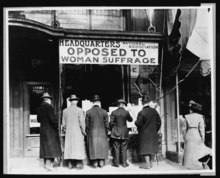Lady Griselda Johanna Helen Cheape (20 December 1865 – 12 February 1934) was a British anti-suffrage campaigner.[1]

Early life edit
Born in Angus, Scotland, Griselda Ogilvy was the sixth child of Henrietta Blanche Stanley and Sir David Graham Drummond Ogilvy, Earl of Airlie.[1]
Family life edit
Griselda Ogilvy married James Cheape of Strathtyrum in 1897. They went on to have three children.[1]
Political activity edit
She was interested in the care of children and enrolled for nursing at the Royal Hospital for Sick Children Edinburgh. She was also assisted at the Pendlebury Sick Children's Home in Manchester, Dundee Royal Infirmary and the London Temperance Hospital.[1]
The issue of temperance was a cause she promoted and she was active within British Women's Temperance Association (BWTA).[2]
She was prominent in the Scottish National Women's Anti-Suffragette League (WASL),[1] founding the branch in St Andrews in 1909 [3]
The BWTA were pro women's suffrage, however the St Andrews branch where Lady Cheape was president (1909–12) [1][4][5] was opposed. In 1913 Lady Cheape formed the 'Beehive'- an anti-suffrage society based in St Andrews.[5] She was the President of the St Andrews Branch of the Scottish League for Opposing Women's Suffrage.[6]
"Lady Cheape believed that direct political representation would undermine, rather than amplify, the idea of feminine moral superiority. Her opinions may be traced to her strongly evangelical approach to temperance reform that emphasised moral, rather than legal, ‘suasion.’"[7]
Death edit
She died in 1934 in London.[1]
References edit
- ^ a b c d e f g Ewan, Professor Elizabeth L.; Ewan, Elizabeth; Innes, Sue; Reynolds, Sian; Pipes, Rose (2006). The Biographical Dictionary of Scottish Women. pp. 71–72. ISBN 0748617132.
- ^ Smitley, Megan (10 September 2007). "'inebriates', 'heathens', templars and suffragists: Scotland and imperial feminism c. 1870-1914". Women's History Review. 11 (3): Issue 3, PP 455–480. doi:10.1080/09612020200200331.
- ^ Elizabeth., Crawford (2006). The women's suffrage movement in Britain and Ireland : a regional survey. London: Routledge. ISBN 0415383323. OCLC 59149398.
- ^ Scottish women : a documentary history, 1780-1914. Breitenbach, Esther. Edinburgh: Edinburgh University Press. 2013. ISBN 9780748683406. OCLC 857078955.
{{cite book}}: CS1 maint: others (link) - ^ a b K., Smitley, Megan (2009). The feminine public sphere : middle-class women in civic life in Scotland, c.1870-1914. Manchester: Manchester University Press. ISBN 9780719079665. OCLC 430498979.
{{cite book}}: CS1 maint: multiple names: authors list (link) - ^ "The Scotsman". 14 December 2006. Retrieved 8 June 2018.
- ^ Smitley, Megan (10 September 2007). "'Inebriates', 'Heathens', Templars and Suffragists: Scotland and imperial feminism c.1870-1914". Women's History Review. 11 (3): 455–480. doi:10.1080/09612020200200331.